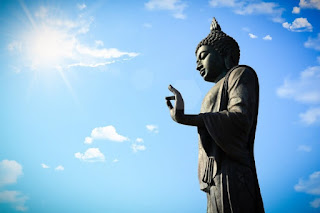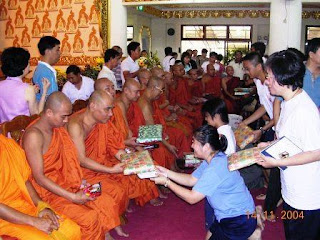Why should we have faith in the Buddha?
Why should we have faith in the Buddha as our refuge? To get the answers, you should first need to know about the Buddha’s life only then we can understand why the Buddha was an exceptionally noble individual who has unrivalled as the most supreme being in the three worlds.
Why should we have faith in him as the teacher of human beings, deities and celestial beings? Stated simply, he is worthy of faith because he discovered and showed all these beings the way leading to cessation of suffering.
To understand why the Buddha is worthy of such faith, we should understand the intrinsic meaning of the word Buddha. In other words, Buddha means “the one who knows”. If we look at the actual meaning in Pali word, it says “bujjhatiti buddho”, whereby when it is transalated in English, it says, “because he knows, he is called Buddha”. What does he know? He knows the true nature of phenomena. Therefore, Buddha means “one who knows true nature”.
In this world, what are all beings looking for? They are seeking knowledge about both mundane and supra-mundane matters. We may say that people are seeking food, clothing, and shelter. Would you be able to earn a living if you did not have the relevant knowledge to make your livelihood? So, you need to seek knowledge regarding your livelihood.
At this point, we need to understand how to gain knowledge of the true nature. The question here, “is this knowledge gained through reasoning?’
If the knowledge were gained via reasoning, the knowledge of the person of superior intelligence would differ from an average person or those with inferior intelligence. In this way, knowledge would change according to one’s intelligence. However, if this knowledge were different, could it still be absolute truth? There is only one single absolute truth. Since the true nature of reality is of only one kind, so how can there be any differences?
A Buddha knows things as they really are, as such, he is called Buddha or sammasambuddha. This Pali word consist of three words which are as follows:
Samma: rightly, properly, in the correct way
Sam: with one’s own insight knowledge (nana)
Buddha: one who knows
Sammasambuddha means one who knows things in the correct way based on one’s own insight knowledge.
The Buddha knew the true nature of reality by looking at things as they really are. Since it was not reasoning or reflecting about them, his understanding was accurate, it was right understanding.
For example, this morning was raining and by looking at the rain, one might assume that it is raining season. Isn’t this seeing what exists as it really is? However, if we were to reflect, “it is raining, but since it is rather hot, it must be the hot season”. Would this be right or wrong? According to the Burmese lunar calendar, this time of the year is designated as “hot season”, but if we see the situation as it really is, it is a raining season. But in conventional term, it is a hot season.
Here are few points to be mentioned. If one wants to know the true nature of things as they really are, can one conduct an investigation from a philosophical point of view? If one could see things as they really are based on a philosophical point of view, there should be a single philosophy. By why are there many different philosophies out there? So it is proven that one cannot see things as they really are via philosophical reasoning.
As such, one needs to see reality by observing it as it is. To know the true nature of phenomena, one needs to observe them as they are without any preconception or reflections based on previous knowledge. If one uses reflection, this understanding will not be in accordance with what really exists.
In order to see things as they really are, one must practise insight meditation according to the method described in the four foundation of mindfulness. Some people think such practice is unusual, peculiar or even very difficult, but this is not the case.
The Buddha knew the true nature of phenomena as they really are, by seeing things as they really were, he attained freedom from greed, hatred and delusion. By freeing himself from these defilements, sufferings also cease.
The Buddha’s teachings show the true way and the right practice which leads to cessation of suffering. When describing the meditation practice of the four foundations of mindfulness which ultimately leads to the cessation of suffering, the Buddha said that one should see things as they really are.
Why should we have faith in him as the teacher of human beings, deities and celestial beings? Stated simply, he is worthy of faith because he discovered and showed all these beings the way leading to cessation of suffering.
To understand why the Buddha is worthy of such faith, we should understand the intrinsic meaning of the word Buddha. In other words, Buddha means “the one who knows”. If we look at the actual meaning in Pali word, it says “bujjhatiti buddho”, whereby when it is transalated in English, it says, “because he knows, he is called Buddha”. What does he know? He knows the true nature of phenomena. Therefore, Buddha means “one who knows true nature”.
In this world, what are all beings looking for? They are seeking knowledge about both mundane and supra-mundane matters. We may say that people are seeking food, clothing, and shelter. Would you be able to earn a living if you did not have the relevant knowledge to make your livelihood? So, you need to seek knowledge regarding your livelihood.
At this point, we need to understand how to gain knowledge of the true nature. The question here, “is this knowledge gained through reasoning?’
If the knowledge were gained via reasoning, the knowledge of the person of superior intelligence would differ from an average person or those with inferior intelligence. In this way, knowledge would change according to one’s intelligence. However, if this knowledge were different, could it still be absolute truth? There is only one single absolute truth. Since the true nature of reality is of only one kind, so how can there be any differences?
A Buddha knows things as they really are, as such, he is called Buddha or sammasambuddha. This Pali word consist of three words which are as follows:
Samma: rightly, properly, in the correct way
Sam: with one’s own insight knowledge (nana)
Buddha: one who knows
Sammasambuddha means one who knows things in the correct way based on one’s own insight knowledge.
The Buddha knew the true nature of reality by looking at things as they really are. Since it was not reasoning or reflecting about them, his understanding was accurate, it was right understanding.
For example, this morning was raining and by looking at the rain, one might assume that it is raining season. Isn’t this seeing what exists as it really is? However, if we were to reflect, “it is raining, but since it is rather hot, it must be the hot season”. Would this be right or wrong? According to the Burmese lunar calendar, this time of the year is designated as “hot season”, but if we see the situation as it really is, it is a raining season. But in conventional term, it is a hot season.
Here are few points to be mentioned. If one wants to know the true nature of things as they really are, can one conduct an investigation from a philosophical point of view? If one could see things as they really are based on a philosophical point of view, there should be a single philosophy. By why are there many different philosophies out there? So it is proven that one cannot see things as they really are via philosophical reasoning.
As such, one needs to see reality by observing it as it is. To know the true nature of phenomena, one needs to observe them as they are without any preconception or reflections based on previous knowledge. If one uses reflection, this understanding will not be in accordance with what really exists.
In order to see things as they really are, one must practise insight meditation according to the method described in the four foundation of mindfulness. Some people think such practice is unusual, peculiar or even very difficult, but this is not the case.
The Buddha knew the true nature of phenomena as they really are, by seeing things as they really were, he attained freedom from greed, hatred and delusion. By freeing himself from these defilements, sufferings also cease.
The Buddha’s teachings show the true way and the right practice which leads to cessation of suffering. When describing the meditation practice of the four foundations of mindfulness which ultimately leads to the cessation of suffering, the Buddha said that one should see things as they really are.




Comments